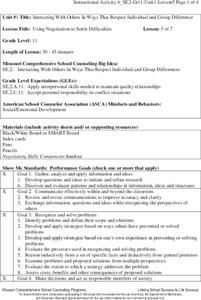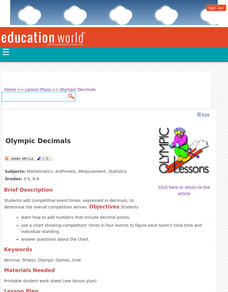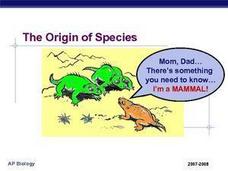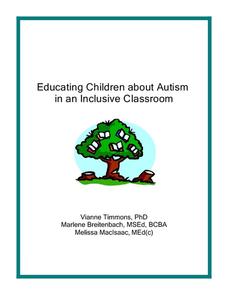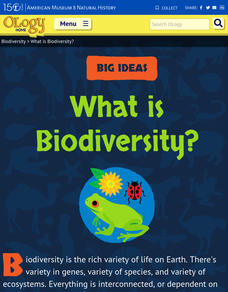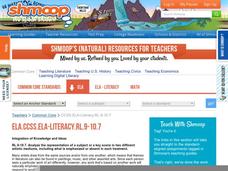Missouri Department of Elementary
Using Negotiation to Settle Difficulties
Negotiating can be a win/win experience if the involved parties apply the skills and techniques offered in a lesson about negotiating to settle differences.
Curated OER
Olympic Decimals
Add competitive event times, expressed in decimals, to determine the winners! Individuals use a chart showing competitors' times in four events to figure each team's total time and individual standing.
Curated OER
Bioethics and Effective Health Care
High Schoolers participate in a class discussion on the ethical issues faced in the health care industry today. In groups, they develop their own definition of bioethics and role play the role of one of the various types of members of...
Curated OER
Sula/Song of Solomon/Tar Baby
Students answer assigned questions as a group, write individual essays, complete a research project, and complete a writing project.
Curated OER
The High Cost of Chemical Dependency
Sixth graders explore, analyze and study the effect and impact that humans have on the environment based on their choices as individuals, businesses and governments. They assess the balance between human activities and aquatic pollution.
Curated OER
Using Negotiation to Settle Difficulties
Eleventh graders explore, analyze and study how to make decisions and act as responsible members of society. They role-play several scenarios of enactments of individuals making choices for resolving conflict while respecting others.
Curated OER
Penguins Around the World
Students investigate penguins. In this Science lesson, students compare and contrast penguins to flying birds. Students use a Venn diagram to illustrate the differences and similarities of penguins and flying birds.
Curated OER
Origin of The Species
After viewing information about different types of isolation, students will see that reproduction among a group will cause the frequency of a specific trait to increase. The history of prominent scientists such as Charles Darwin are and...
Curated OER
Why Do Governments Exist? Locke, Hobbes, Montesquieu, and Rousseau
Here is a great secondary source reading that includes the primary ideas and philosophies of the famed Enlightenment philosophers: Thomas Hobbes, John Locke, Charles Montesquieu, and Jean-Jacques Rousseau. In additional to discussing...
Curated OER
Educating Children about Autism in an Inclusive Classroom
How do we meet the needs of learners with autism? Find out with an in-depth study that offers a thorough explanation of autism—what it is and how unique every individual's case may be, nine lesson plans spanning from...
American Museum of Natural History
What is Biodiversity?
Not all dogs are the same just like not all finches are the same. An interactive online lesson helps individuals learn about the causes and limitations to biodiversity. The clickable sections describe the basics of the genetics of...
NOAA
Climate Is Our Friend…Isn’t It?: Make an Extinction Polyhedron
Climate affects populations in different ways. Scholars research extinct organisms and mass extinctions in part three of the 10-installment Discover Your Changing World series. They create graphic organizers, then fill in the...
Curated OER
Measuring Mixed Numbers
Mixed numbers can be added conceptually, algorithmically, and physically. Have the class visualize mixed numbers by adding fraction bars together. They then discover the algorithmic process that simplifies adding mixed numbers. Finally,...
Curated OER
Rights in Early America
Get your historians to hop into someone else's 18th century shoes with a simulation on rights in early America. Each individual gets an identity card, indicating their race, gender, and status (slave or free). Areas around the room are...
Macmillan Education
Cultural Awareness
The importance of cultural awareness, of becoming aware of our own and other cultures, and the benefits of gaining a deeper understanding of the differences between cultures, is the focus of this resource. Working individually, in pairs,...
Ellsworth American
Think About the Newspaper
Investigate the significance of adjectives with a newspaper activity that addresses effective language. Readers probe teacher-provided articles in search of the mighty modifiers, and practice by replacing them with a different word, and...
Curated OER
Good Apples
Students investigate diversity. In this diversity lesson, students look at a variety of apples in order to compare and contrast their physical characteristics. They apply the concept to people by listing how people are the same and...
Curated OER
Regarding the Fountain: A KWHL Strategy
A KWHL strategy prepares young readers for the different type of writing found in Kate Klise's story of the Dry Creek Middle School drinking fountain. Step-by-step directions, student and teacher copies of the KWHL template, and...
Starry Night Education
The Stars
Three astronomy activities in one resource! Here you will find one hands-on activity, one demonstration, both with discussion questions, and one activity worksheet. During these lessons young scientists discuss how stars are...
Shmoop
ELA.CCSS.ELA-Literacy.RL.9-10.7
Use this resource's pairings of classical literature and paintings to practice the skill of comparing different artistic mediums with your ELA class. Addressing standard 7 for literature in the Common Core, the resource encourages your...
Illustrative Mathematics
How Long
It won't take young mathematicians long to learn how to measure length with this fun, hands-on activity. Working in pairs, children use Unifix® or snap cubes to measure and record the lengths of different classroom objects. To extend the...
Center for Learning in Action
Investigating Physical and Chemical Changes
Super scientists visit ten stations to predict, observe, and draw conclusions about the physical and chemical changes that occur when different states of matter—liquid, solid, and gas—are placed under a variety of conditions. To...
Teach Engineering
What's Wrong with the Coordinates at the North Pole?
Here is an activity that merges technology with life skills as individuals use Google Earth to explore the differences between coordinate systems and map projections. The self-guided worksheet is the fourth segment in a nine-part unit....
Curated OER
Library Media: Poetry
Fifth graders explore different kinds of poetry. They work in groups to collect different styles of poetry. Then they use charts to organize the attributes of various poems. Conclude the instructional activity by having each individual...


